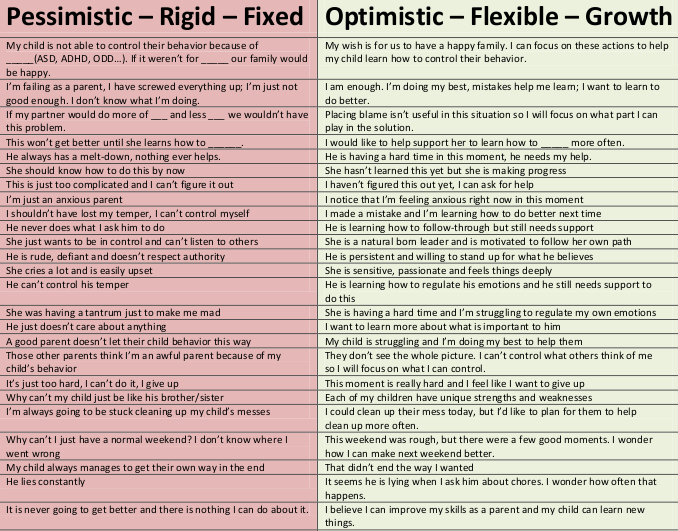Why Optimism is a key ingredient to effective parenting
Every parent faces difficulties and challenges but how you talk yourself through those difficulties will have a huge impact on your ability to parent effectively.
Mark Durand and his research team have shown that one of the best predictors of a child’s behavior rests on parental optimism. If a parent can persist through the difficult moments, hold on to the hope that their child can behave better and trust their own parenting abilities, they will see more progress.
Being an optimistic parent means that you see the challenges and difficulties as part of the learning process; and you recognize that they aren’t permanent.
If someone believes that a particular challenging situation is permanent they will have very little motivation to do anything to improve the situation. A pessimistic parent will be more likely to place blame on themselves or the child and describe the situation as too big to handle (e.g., nothing will help, it will never get better, there is no use in trying).
Our thoughts and feelings about parenting will have a significant impact on our actions as a parent. The words we use to describe our experience have a powerful influence. If we are stuck in pessimistic and rigid thought patterns it will be much more difficult to experience success.
You may have heard that emotions are contagious and there seems to be some truth to this. If parents approach their child with a negative expectation and belief, the child will pick up on that. For example, if you assume the trip to the dentist is going to be a nightmare it probably will be. Both pessimism and optimism are contagious and can have an effect on the whole family.
How you view challenges will set you up for success or failure. If parents are stuck in a pessimistic view of themselves and their child, it will be harder to learn from their experiences; they may instead feel helpless and hopeless which inevitably leads to a desire to give up, escape or avoid.

Most parents feel in over their head at some point; they may have feelings of guilt, inadequacy and discontentment. These are normal but allowing them to be the whole story can get in the way of being the parent you want to be.
Some of these rigid thought patterns can significantly interfere with your ability to parent effectively – they may cause you to doubt yourself, hesitate, loose motivation, get paralyzed with big emotions, or give up. How you talk to yourself about yourself will impact how you parent. This is why it is so important to notice what stories you tell yourself and identify the ones that are not useful.
Which of these sound familiar to you?
Some examples pulled from: Bowler, M. (2020) The Parent’s Guide to ODD
The good news is that optimism is a skill and all skills can be learned little by little.
How to be a more optimistic parent?
Notice your own experience
It first starts with noticing thoughts and feelings about yourself and your child in the good moments and the difficult moments. Notice the rigid thinking patterns and inflexible stories that you tend to believe. Notice how certain words and phrases can make things seem hopeless (e.g, never, always, can’t). Remember to notice your own patterns with kindness and curiosity.
Parent in the moment
Be present with your child; there will always be things to do or plans to make, but it’s important to take the time to put those things aside and be fully present in the moment with your child. Start small, try taking 10 minutes a day to give your child your undivided attention – join them in an activity and practice giving them your full attention. Simply be with them. Your mind will wander but bring it back. Then practice again, and again.
Believe things can get better
Believe that you can make a difference in your child’s life – that your actions can and will improve the situation. As a parent, you have the biggest impact on your child’s life. Having confidence in yourself as a parent is very important; trust your instincts but recognize when you need help. Everyone can learn new things and make improvements in their lives – both children and parents.

Find the good and praise it
I often tell parents find the good and praise it in reference to their child’s behavior but it can also apply to your own behavior as well. Notice the things you are doing right as a parent; chances are there is a lot you are doing right already. Give yourself some credit. You do not need to be perfect to be effective. Notice progress, celebrate the small steps and express gratitude.
Take care of yourself
You cannot pour from an empty cup. It is not selfish to take care of yourself, it is essential! Self-care must be scheduled into your life as a priority. You will be a better parent if your own needs are taken care of. This includes self-compassion when you drop the ball or make a mistake.
Parenting is full of difficult moments that push your patience and sometimes even sanity but it’s also full of moments of incredible beauty and joy; it’s just like the weather – sometimes it storms and sometimes it’s a beautiful sunny day. Optimism helps us be flexible when things are hard – to bend and adapt rather than snapping under pressure or giving up. It helps us see the big picture and keep going even when it’s not easy.
Parenting with optimism means being aware of your perception and actively looking for the good. It means looking at your child’s struggles through a lens of hope – re-framing the story to allow for growth and improvements rather than getting stuck in a story of hopelessness. You can’t control the challenges that life brings your way, but if you approach those challenges with optimism and flexibility you will be resilient to get through the storms and able to enjoy the sunny days.


